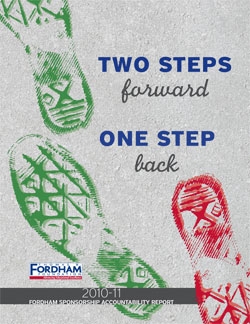Two steps forward, one step back
Kathryn Mullen Upton, Terry RyanCharterin' ain't easy
Does School Autonomy Make Sense Everywhere? Panel Estimates from PISA
Tyson EberhardtWhich came first, development or autonomy?
Schooling in the Workplace: How Six of the World’s Best Vocational Education Systems Prepare Young People for Jobs and Life
Laura JohnsonAmerica: Take notes
Testimony on the Federal Role in Education Research: Providing Relevant Information to Students, Parents, and Educators
Chester E. Finn, Jr.Russ Whitehurst, pulling no punches
The cost of K-12 dropouts
Chris TessoneStudents who don't finish school hurt the efficiency of our education system.
Ohio needs competition and high standards to elevate its digital learning marketplace
Terry RyanOne could argue that 2011 has been the year of ?digital learning? across America but in fact digital learning has been big business in Ohio for more than a decade. Lessons from that experience should inform the Buckeye State?s approach to new digital learning opportunities that are generating excitement and optimism.
Two Steps Forward, One Step Back: Fordham Sponsorship 2010-11 Year in Review
Terry Ryan, Kathryn MullenSince their inception in 1997, charter schools have been at the center of some of the most politically contentious debates about education in Ohio. The past year offered yet another example of charter school controversy, but this time with a twist. The 2010 elections were very good for Buckeye State Republicans, with John Kasich winning the governor?s race (replacing Ted Strickland who had been a charter adversary throughout his four-year term). Republicans also took control of the House while expanding their majority in the Senate.
Two Steps Forward, One Step Back: Fordham Sponsorship 2010-11 Year in Review
Kathryn Mullen Upton, Terry RyanWILD AND WACKY POLITICAL BATTLES
Holiday feast: STOP THE PRESSES!!! And pass the gravy.
Peter MeyerPeter Meyer previews the latest edition of Education Next.
Two Steps Forward, One Step Back: Fordham's 2010-11 Sponsorship Accountability Report
Kathryn Mullen Upton, Terry RyanThe Thomas B. Fordham Foundation is pleased to share its latest annual Sponsorship Accountability Report, Two Steps Forward, One Step Back. The sixth of its kind, the report reflects on Ohio??s charter school policy environment and the performance of Fordham sponsored charter schools ??? in terms of absolute achievement, growth, and adherence to goals set forth in our authorizing contract ??? as well as developments in state law over the year. Despite some tough battles during the state budget as it relates to holding authorizers (and operators) accountable, overall Fordham and its schools had an encouraging year, with Fordham sponsored-charters making achievement gains and positioning themselves to do even better in the future.
Pricing public education
Chris TessoneReformers who are focused on ?doing more with less? in the nation?s schools should reclaim the high ground on school finance. Case in point: the rising cost of higher education in California.
Suffering schools should learn to do more with less
As school levies fail across central Ohio, I am concerned and disappointed to see so many school districts quickly threaten to reduce the quality of our children?s education. Providing an excellent education for our children may be the single most important thing we can do as responsible citizens.
How about better parents? Ask Clarence Lee
Peter MeyerPeter Meyer reflects on Tom Friedman's column about parents and education.
Does our school funding system threaten digital learning's potential?
Tyson EberhardtEducation technology is a hot sector for innovative entrepreneurs and ambitious investors. While interest and investment in digital education skyrocket, though, the inflexibility of the existing school funding system may stifle its potential?at least according to Paul T. Hill in "School Finance in the Digital-Learning Era," the latest installment in Fordham's Creating Sound Policy for Digital Learning series.
For next-generation educating, we need next-generation funding
Futurists have long regaled us with predictions about technology dramatically improving education by giving millions more students access to the very best teachers and deploying computer-based systems that allow them to learn at their own pace at whatever time and place works best for them. This vision is now becoming a reality, partly because tight budgets are forcing K-12 schools to employ fewer teachers and boost the productivity of those who remain.
Rhode Island pension reform is not a success story
Chris TessoneLast night, Rhode Island?s legislature passed a sweeping reform of its public-sector retirement system. It cuts retiree benefits, mostly by suspending cost of living adjustments, and institutes a cheaper hybrid plan with a 401(k)-like private account component, and it should save taxpayers billions of dollars in coming years.
From talking the talk to walking the walk of urban school choice
Emmy L. PartinFordham has been involved in the arena of school choice in Ohio at virtually every level for the past decade, except that of a parent. Issues of school choice and the quality (or not) of urban schools have been a big part of my professional life the last five years. Now, they are front and center in my personal life, too.
Like peanut butter and chocolate: Digital learning and excellent teachers go well together
With you for me, and me for you?
For next-generation learning, we need next-generation funding
Dear funding structure, Stop crippling innovation. Sincerely, Paul
Keeping Pace with K-12 Online Learning: An Annual Review of Policy and Practice
Laura JohnsonExpanding digital learning the most inefficient way possible: One district at a time
Online and Blended Learning: A Survey of Policy and Practice from K-12 Schools Around the World
Daniela FairchildHas anyone got this figured out yet?
Online K-12 Schooling in the U.S.: Uncertain Private Venture in Need of Public Regulation
Tyson EberhardtSurprisingly sound recommendations from the anti-capatalists

